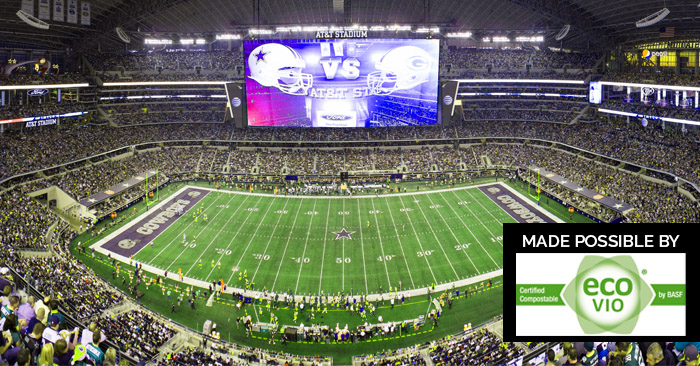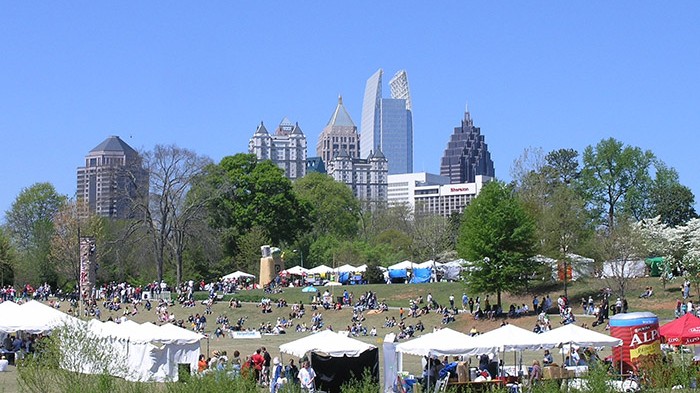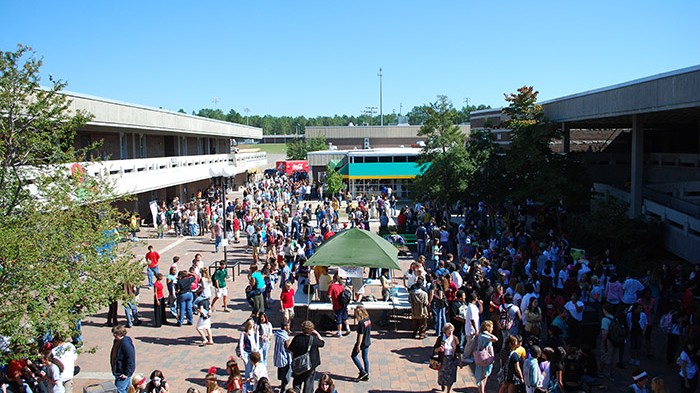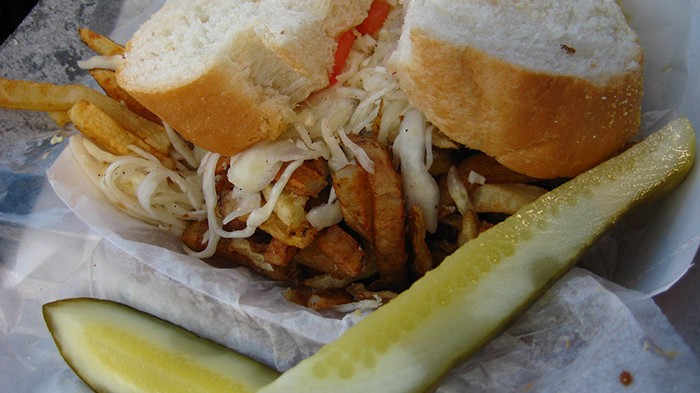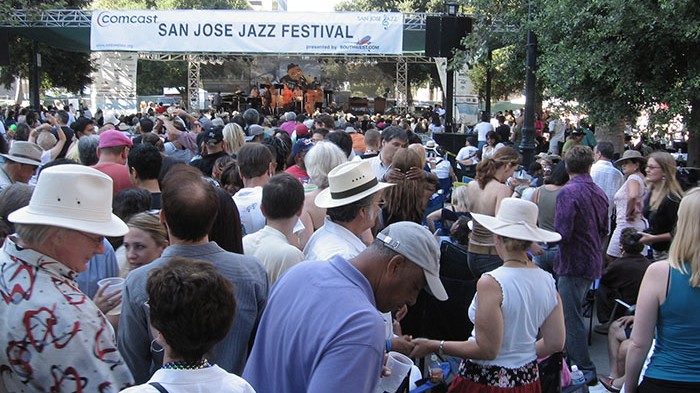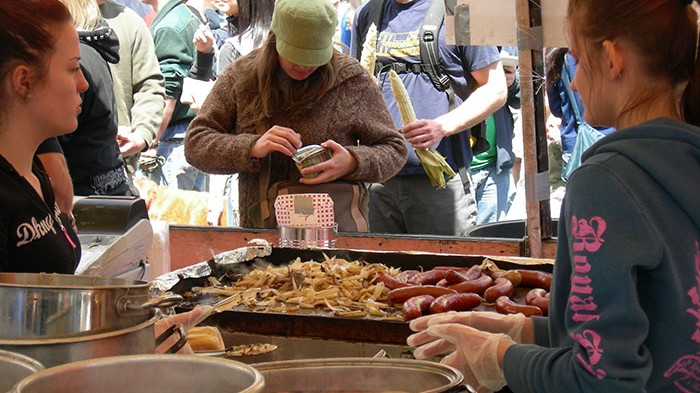TRANSCRIPT
Making an Event Zero Waste
Q: Can you tell me what goes into making an event zero waste – what it’s about and what you do to make this happen?
Leslie Lukacs: Yeah, we usually get involved with the event right at the beginning so that we’re part of the planning team. We create a plan to get to zero waste and we work with all the different groups that are organising the event – from the event promoter, to sponsorship, to volunteers…And then we also order equipment, like the type of recycling and composting bins the event will need. We do any training for exhibitors or food vendors. Then we set up systems to collect the materials for either recycling, composting or reuse. And one of the big items that is reused is the food at the end of the event, so we make sure that we partner with local non-profits or some time of food bank for homeless shelters to make sure that any leftover food goes back out to the community instead of the landfill.
Q: What are you usually aiming for, in terms of diversion rates?
LL: So for us when we plan a zero waste event, our goal is to get a ninety percent or better, and so the main thing that goes into that is designing the event to go for zero waste, you can’t just go to an event and just recycling and collect materials on the backend, you really have to plan for your event to be zero waste.
Q: What happens generally with the rest of the food waste?
LL: Yeah, so in designing a zero waste event, you have to design for zero waste. So you have to make sure that the materials that you use, or the items that are being used and sold at the event are compostable and recyclable. So when we go to zero waste, we typically have a two-bin system – one bin for the recyclables and one bin for the organics – because we make sure all the vendors are using maybe compostable products and we’re really minimizing the waste that’s in the event in the first place. So for the organics, vendors might have used compostable plates and cups and utensils – and all that gets mixed in with the organic material, like the food. And yes, that material goes to a composting site.
Compostable Plastics and Reusable Servceware: Challenges & Solutions
Q: And you mention compostable plastics here. We did an episode on the show not too long about the standards in compostable plastics, and the challenges we face at the moment, as standards do not always represent what composters are dealing with on the ground.
You make sure to use BPI certified plastics when you’re using compostable plastics – but not all composting sites will accept the plastics as the rate they decompose can be at odds with their composting rate, so you have to check with your composting facility and be careful what plastics you go for. So you face challenges here for using compostable plastics…
LL: Yeah, and it’s confusing for the public because it’s a new product out on the market in terms of what they’re used to seeing. And it looks and feels like plastic to them as well, and it’s easy for event attendees to put that material into a recycling bin thinking it’s just regular plastic. And then there’s also a challenge on the back-end if those recyclables are going to a material recovery facility; sorters at a material recovery facility also get confused if it’s plastic or compostable. So if we have to use that material then marketing and messaging is very important. One thing we do is have a green bar around the compostable product that says “composting” so that it’s more clear to the public and to the waste sorters that this material should be composted instead of recycled.
Q: If you were setting up an event, and the local facilities won’t accept the compostable plastics you’re looking to use – what do you do then?
LL: You know, we would actually love to see reuse. The compostable are just another single-use, disposable product at the end of the day, and there are some possible benefits to that, but the reality is that it’s just another disposable product. And we have demonstrated at large-scale events – maybe ten or twenty thousand people – where actually we have a reuse system with plates and cups and utensils. It’s a deposit-based system, where when they go to a food vendor, they’re actually given a reusable plate and cup and fork for deposit. And we’ve done deposits anywhere from one US dollar to five US dollars.
And when they’re done eating, we have these buckets and stations all around the food service area, and they can just put their plates and cups in the buckets there, and we have an attendant who will give them the refund back. And if, for some reason, they don’t put the item back or they take the item, at least we’re left with some funding to go replenish the supply of plates and cups and forks. And for some events, like some on-site, multiple-day music festivals, we’ll do washing stations as well where there’s a crew, and that’s part of the service or what the event is paying for – that we’ll be washing the dishes right on-site.
Preparing A Zero Waste Strategy for Different Types of Events
Q: When we talk about events, we’re talking about festivals, music festivals, arenas, fairs and so on, and as someone who has worked with all these different types of events – would the approach be different for each type of event, or is there a basic blueprint that you follow for all of them?
LL: Your approach changes event-to-event, and it can even change from the same type of an event, because each facility is unique and each area is unique, and so I’ve set-up zero waste programs for major stadiums for sixty, seventy or eighty thousand people, down to small community festivals, like music festivals or cultural festivals, and multiple-day festivals – so they’re all vary unique. If you can control what’s being purchased for the event, then it’s a lot easier.
So let’s take a stadium for example, where people have to buy a ticket to get in and they can only buy the products that are sold in that stadium. And then it’s much easier to control how to recycle and compost if you can control the products they’re buying. But if it’s like a street festival where it’s open to the public, then that’s a lot more difficult because they can bring in their coffee cup, or something that you haven’t really planned for that is just destined for the landfill because of the type of product it is – like baby diapers. So sometimes there are various challenges within each type of event, so we really have to understand the event to design the correct type of program.
Q: And would you say street festivals would be the most challenging out of all the ones you’ve worked on?
LL: Yeah, I think parades are…actually, I’ve never done a zero waste parade, and I’ve worked with one community who has a famous parade called the Rose Parade in Pasadena on New Years every year. And I just don’t know the way to work with the parade, because in a parade like that, people spend the night on the streets the night before and it’s a big deal for the community. So yeah, those are harder ones – you know, street festivals where it’s open to the public provide a little bit more challenges.
And there’s just different behaviour at different types of events: like I’ve also worked with performing art centres, and the behaviour is that you might have your drink, or you might bring something into the theatre, but you carry it back out with you. Whereas a stadium at a football game, the behaviour is that you just leave whatever you used or consumed right there on the ground. So you have to be aware of different behaviour so you can, again, design the right type of program.
Q: I’d like you to share how exactly you go about making an event zero waste. Can you talk me through the first steps?
LL: Sure. First we work with the event organiser, and we ask for a list of the types of food vendors that he’s going to have, so we can understand the number of booths and the type of food being served, and if exhibitors are going to be generating single use products – like, for example, a bag of chips, in which the material the chips come in isn’t recyclable or compostable. So we try and identify problematic products first, and if the event does want to go to zero waste, they have to take it very seriously, because we need everybody’s help. And so sometimes what we do is we have the vendors sign an agreement that they are going to use products that are compostable and recyclable, and that they’re going to help us with this zero waste program.
With some events they’ve even gone so far as putting in the contract language that if you don’t support the zero waste program then you can get fined or warned, and if they are a repeat offender then they won’t be invited to come back to the event the following year. So, sometimes when we start talking about zero waste, costs are a concern to the event organiser, and one thing that we’ve done to address costs is to look for sponsorship funding. And we’ve created a whole new type of sponsorship package, and we call it a green sponsorship package, or a sustainability sponsorship package. So on recycling bins or on the marketing material, we’re able to say, “This company is bringing you the sustainability program”, or “we thank this particular company for their financial support in making zero waste a reality”. So we’re able to identify new funds that can help offset these costs for an event to invest in either recycling bins or compost bins, or anything else that may be an additional cost.
Education is the Key
Q: And education I’m sure features a great deal in your work. Can you tell me more about that, and whom exactly you work with?
LL: There is education on all levels for all the different people involved in an event, from working in the event to attending the event. So with education prior to the event, I mentioned contracts that we do and vendor agreements, we also attend pre-event meetings and we do presentations. We’re part of the team, so we’re educating all the different groups that organise events at the same time. And then, if we’re going to solicit for volunteers, we do a training the day before with those volunteers and those volunteers may help collect the material. We recruit volunteers to save costs for the event, and we try and identify something of value to them to keep the volunteers – for example if it’s a music festival they would get a day for free, or if it’s a community festival we would provide them meals or a ticket to get in. And we do make sure all the volunteers have a t-shirt or something that identifies them as working at the event and being part of the green team.
So we do the training a day before, and then we also make sure they’re trained the day of, because even though it might seem easy just to clean out recycling bins or sort material, we need it to happen in a systematic way so that the event flows properly and we’re not in anybody’s way. So we make sure they’re trained.
And then on the public side, we look for any way to educate the public. We’ve done anything from stage announcements, at stadiums we might do an announcement on the jumbotron, to trying to get inside the program – so if it’s a musical or concert venue we’re in the program itself that talks about the recycling program. We’ve done banners, signage; even the bins themselves serve as a form of marketing. So yeah, we just do anything we can possible to make sure the public is aware of the recycling procedures.
Another thing that we do in terms of marketing or education is we partner with a well-known person – if it’s a music festival or a sporting event we try and get maybe one of the acts to do some type of sound bite or some type of messaging for the recycling program, as well as within a stadium, using the local heroes to do some type of marketing for us.
Involving Local Composting and Anaerobic Digestion Sites
Q: Another important thing is establishing a connection with the local composting or AD site as well. Can you tell me a bit about how you involve the local composting sites?
LL: Yes, usually a part of designing a program is to identify which composting site can take the materials, and who is going to haul those materials. So, a lot of communities that contract a hauler for the city, they also do the hauling for organics collection, so we just have to make sure that whoever is hauling the material, takes it to the correct facility.
Sometimes there are locations where there is no commercial composting, and when that happens it’s actually a lot more difficult to get to zero waste. So some of the things that we have done is that we were in a more rural area for a music festival on private land and the owner allowed us to create a compost pile right there on his property. So we brought in a chipper and we were able to chip the compostable products, and we were able to create the right mixture with the biodegradable products and food, and create the compost pile right on site. Some other ideas would be contacting local pig farmers or other types of farmers to see if they would be interested in just the pure food waste.
So we’ve been able to manage it like that, but those are exceptions: the majority of projects that I work with, it goes to a commercial composting site.
Changes Needed For Successful Organics Diversion
Q: And typically how big are the changes needed to make an event zero waste? I’m thinking about the event organisers here, because as you said before, they might be worried about costs, but would they also be worried about structural changes for example?
LL: That’s really where I come in, you know, they have so many other things to worry about and I try to make it as easy for them and the event as possible. And in terms of budget – many events already have a cleaning budget and they’re used to hiring some type of group to do the cleaning, so that’s typically the budget that we draw from. This would be for more for a temporary event like a music event or something, but instead of putting the money towards a cleaning company, they would put their money into a zero waste company. And that company would make sure the event was as clean as possible, but also sort out the materials on the back-end and make sure that they go to recycling and composting.
But when I work with a venue, for example like a stand-alone facility that puts on events, I do the training internally. So I’m actually training how the employees collect and manage the material – I don’t bring in crew, I use their crew. It’s all training and getting that that company or that venue up to speed on how to go zero waste.
Sometimes it takes years. Sometimes if a sports venue, or a zoo or theme park wants to go zero waste, it doesn’t happen overnight, it can take months or years to get to zero waste because you are making changes and sometimes those changes take longer. Also, like, changing the products that you’re using. Or getting rid of other products and finding new products to take care of older products that were just destined for the landfill.
Q: I would imagine that depending on the size of the event, and the type of event, you would need a certain amount of people to work with, or a team, to implement the changes. Can you talk me through the difference in terms of the team needed, for a small, medium and large event?
LL: It always varies and depends on the event. It’s hard to just give a general number. But when I work with a stadium or a theme park, or some type of tourist attraction, that’s just me. It doesn’t really require much more. And so in that situation we might write a plan for their facility; I’ll look at their sponsorship and see what type of funding they can get through sponsorship, and then I’ll work with their event manager. Once the facility manager or facility director approves the program, I tend to work with more with the events manager, as well as the facilities manager – the person who’s in charge of making sure that facility is clean. So that’s how the changes happen.
But if it’s a festival and a one-time event in public space and they do want staff – the more staff the better. More staff is an increase in how much it’s going to cost, so we’d have to look at volunteers and if there’s a good market for volunteers. So it really just varies. One thing that I do want to say about volunteers is that if you have anybody who’s interested in volunteers: we’ve seen that about twenty-five to fifty percent of the volunteers that sign up do not show up. So if you are planning volunteers, make sure you plan for more volunteers than what you need, because some people have very good intentions but may not be able to actually take off the time.
Common Challenges For Organics Diversion
Q: What are the challenges you face for setting up the system?
LL: I think the biggest challenge is change. If it’s with a stand-alone facility or some type of venue, many people aren’t as open to change and so sometimes I find that when I’m talking about all these changes that they might not believe it would happen, or that they don’t think it can happen. Or if an employee somewhere along the way had already suggested this and they didn’t do it… So it’s just really about trying to work with the people within the venue and working through that change and making that transition as easy as possible for them.
What I find, when I go into these venues, is that about ten percent love the idea: they support zero waste, they want to be composting and recycling because they already do it at home, so they are fully supportive of this program. And probably about another eighty percent don’t mind, as long as it doesn’t infringe on their day, or take too much time out of their day – you know, they’ll support it and they’ll go along. And really, only about ten percent are the naysayers and talk about how this can’t happen – they’re the ones who have an issue with change. So what I try and do is identify the top ten percent that really support the initiative, and I make them leaders internally, and I provide them with whatever tools they need to make this succesfull. So it’s great when you see that ten percent, and then the eighty percent who will do it if it’s easy for them…And so that’s how we address change, by working with those who want it first, and then…
Q: …Bring the rest along with you….
LL: Correct, yes.
Q: And are there any other challenges, maybe logistically speaking?
LL: There’re always little logistic things that come up, and it’s just the nature of events when you’re dealing with so many people coming to an area at one time. So I would say just expect for things to happen, and to know that it probably won’t run smoothly, there probably will be things that come up. You just need to be able to think quick on your feet and find solutions that work. And maybe something you did didn’t work, but now you have a better start for next year.
One thing that I do is that I create a report after the event, and part of my report is pros and cons, challenges and solutions. So we identify things that we can do better – because there’s always something that you can do better – and then we identify solutions so that the next time this event happens it just gets better and better with time.
Q: For my final question: is there anything you’d like to see happen in the near future in relation to zero waste events or how they are organised?
LL: I would love to see more and more events be zero waste, and go zero waste, because it’s actually a lot easier than what they think. There are challenges and items that need to be identified when planning this, but it’s actually a lot easier than you think, and I think it’s just such a better sustainable way to manage your event. And you have lots of people coming to an event and you have this audience, so why not take that opportunity to also educate them on sustainability and provide them the tools so that they can be responsible event goers. I think it’s really important to educate the public that they can do this. Because, let’s face it, most people go to some type of community event every year, so if we’re educating these people, then we have a better change that they’ll do this at home as well.


